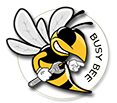Hi guys,
Getting the feeling I've bitten off more than i can chew. I am attempting to use some code to be able to run a beer can filler, i have working code however it uses solenoids which are obviously just on or off. I need to change out the solenoids for servos and coming up short on how to change the code to reflect the servos moving 90 degrees rather than turn a solenoid on or off.
Any help would really be appreciated.
The code im using is below, BEER_INLET_SOL_* are the ones i want to change out.
/**
* Open Beer Filler
* Copyright (c) 2020 Gerhard Potgieter [ https://gerhardpotgieter.com ]
*
* Based on an idea by Christopher Harrison-Hawkes [ https://harrisonsbrewery.com ]
*
* This program is free software: you can redistribute it and/or modify
* it under the terms of the GNU General Public License as published by
* the Free Software Foundation, either version 3 of the License, or
* (at your option) any later version.
*
* This program is distributed in the hope that it will be useful,
* but WITHOUT ANY WARRANTY; without even the implied warranty of
* MERCHANTABILITY or FITNESS FOR A PARTICULAR PURPOSE. See the
* GNU General Public License for more details.
*
* You should have received a copy of the GNU General Public License
* along with this program. If not, see < http://www.gnu.org/licenses/>.
*
*/
#pragma once;
// Library includes.
// AVR(UNO) Libraries.
#ifdef __AVR__#include "TimerOne.h";
#endif;
// Project specific includes.
#include "Config.h";
#include "InputConfig.h";
/**
* ***************************************************************************
* ************************* VARIABLES ***************************
* ***************************************************************************
*/
volatile bool fillSensor1Triggered = false;
volatile bool fillSensor2Triggered = false;
volatile bool fillSensor3Triggered = false;
bool idleMessageDisplayed = false;
enum ProgramState {
UNDEF,
IDLE,
START,
FILLING,
STOP
};
ProgramState currentState = UNDEF;
/**
* ***************************************************************************
* ************************** FUNCTIONS **************************
* ***************************************************************************
*/
void setupPins() {
// Filler solenoids.
pinMode(BEER_INLET_SOL_1, OUTPUT);
pinMode(BEER_INLET_SOL_2, OUTPUT);
pinMode(BEER_INLET_SOL_3, OUTPUT);
// CO2 solenoid.
pinMode(CO2_PURGE_SOL, OUTPUT);
// Fill rail solenoid.
pinMode(FILL_RAIL_SOL, OUTPUT);
// Beer belt solenoid.
pinMode(BEER_BELT_SOL, OUTPUT);
// Fill sensors.
pinMode(BEER_FILL_SENSOR_1, INPUT);
pinMode(BEER_FILL_SENSOR_2, INPUT);
pinMode(BEER_FILL_SENSOR_3, INPUT);
// Start/Stop button.
pinMode(START_BUTTON, INPUT);
}
/**
* Setup a non-blocking interrupt timer for checking the fill sensors.
*/
void setupFillSensorsTimer() {
Timer1.initialize(FILL_SENSORS_TIMER_FREQUENCY);
Timer1.attachInterrupt(checkFillSensors);
}
/**
* Check if the fill sensors have been triggered.
*/
void checkFillSensors() {
if (FILL_SENSORS_TRIGGER < analogRead(BEER_FILL_SENSOR_1)) {
triggerFullFillSensor1();
}
if (FILL_SENSORS_TRIGGER < analogRead(BEER_FILL_SENSOR_2)) {
triggerFullFillSensor2();
}
if (FILL_SENSORS_TRIGGER < analogRead(BEER_FILL_SENSOR_3)) {
triggerFullFillSensor3();
}
}
/**
* Fired when fill sensor 1 is triggered as full.
*/
void triggerFullFillSensor1() {
if (!fillSensor1Triggered && hasProgramState(FILLING)) {
closeBeerFillerTube(BEER_INLET_SOL_1);
fillSensor1Triggered = true;
Serial.println("Filler tube 1 closed");
}
}
/**
* Fired when fill sensor 1 is triggered as full.
*/
void triggerFullFillSensor2() {
if (!fillSensor2Triggered && hasProgramState(FILLING)) {
closeBeerFillerTube(BEER_INLET_SOL_2);
fillSensor2Triggered = true;
Serial.println("Filler tube 2 closed");
}
}
/**
* Fired when fill sensor 1 is triggered as full.
*/
void triggerFullFillSensor3() {
if (!fillSensor3Triggered && hasProgramState(FILLING)) {
closeBeerFillerTube(BEER_INLET_SOL_3);
fillSensor3Triggered = true;
Serial.println("Filler tube 3 closed");
}
}
/**
* Return whether all fill sensors have been triggered or not.
*/
bool allFillSensorsTriggered() {
return fillSensor1Triggered && fillSensor2Triggered && fillSensor3Triggered;
}
void resetFillSensorTriggers() {
fillSensor1Triggered = fillSensor2Triggered = fillSensor3Triggered = false;
}
/**
* Open a single beer filler solenoid.
*/
void openBeerFillerTube(int fillerTubePin) {
digitalWrite(fillerTubePin, HIGH);
}
/**
* Close a single beer filler solenoid.
*/
void closeBeerFillerTube(int fillerTubePin) {
digitalWrite(fillerTubePin, LOW);
}
/**
* Open all beer filler solenoids.
*/
void openAllBeerFillerTubes() {
Serial.println("Opening all beer filler tubes");
digitalWrite(BEER_INLET_SOL_1, HIGH);
digitalWrite(BEER_INLET_SOL_2, HIGH);
digitalWrite(BEER_INLET_SOL_3, HIGH);
}
/**
* Close all beer filler solenoids.
*/
void closeAllBeerFillerTubes() {
Serial.println("Closing all beer filler tubes");
digitalWrite(BEER_INLET_SOL_1, LOW);
digitalWrite(BEER_INLET_SOL_2, LOW);
digitalWrite(BEER_INLET_SOL_3, LOW);
}
/**
* Open the CO2 purge solenoid, wait a while and then close it again.
*/
void purgeCO2(bool retract = false) {
Serial.println("Purging CO2");
digitalWrite(CO2_PURGE_SOL, HIGH);
if (!retract) {
delay(CO2_PURGE_PERIOD);
} else {
delay(CO2_PURGE_RETRACTION_PERIOD);
}
digitalWrite(CO2_PURGE_SOL, LOW);
}
/**
* Raise the fillter tubes out of the bottles.
*/
void raiseFillerTubes() {
Serial.println("Raising filler tubes");
digitalWrite(FILL_RAIL_SOL, HIGH);
delay(CO2_PURGE_RETRACTION_DELAY); // We use CO2_PURGE_RETRACTION_DELAY here as we want to start purging with CO2 as the fill rail raises.
}
/**
* Lower the filler tubes into the bottles.
*/
void lowerFillerTubes() {
Serial.println("Lowering filler tubes");
digitalWrite(FILL_RAIL_SOL, LOW);
delay(FILLER_TUBE_MOVEMENT_DELAY);
}
/**
* Move the beer belt, wait a while and then stop it again.
*/
void moveBeerBelt() {
Serial.println("Moving beer belt");
digitalWrite(BEER_BELT_SOL, HIGH);
delay(MOVE_BEER_BELT_PERIOD);
digitalWrite(BEER_BELT_SOL, LOW);
}
/**
* Code to run when we are in the IDLE ProgramState
*/
void idleState() {
if (!idleMessageDisplayed) {
Serial.println("Press Start Button to proceed");
idleMessageDisplayed = true;
}
readStartButton();
}
/**
* Code to run when we are in the START ProgramState.
*/
void startState() {
moveBeerBelt();
lowerFillerTubes();
purgeCO2();
openAllBeerFillerTubes();
changeProgramState(FILLING);
}
/**
* Code to run when we are in the FILLING ProgramState.
*/
void fillingState() {
// Check if we are done filling.
if (allFillSensorsTriggered()) {
raiseFillerTubes();
purgeCO2(true);
resetFillSensorTriggers();
// If done filling, check if we want to do continuous filling or go back to the UNDEF state.
#if defined(CONINUOUS_FILLING)
changeProgramState(START);
#else
changeProgramState(IDLE);
#endif;
}
}
/**
* Code to run when we are in the STOP ProgramState.
*/
void stopState() {
// Reset the sensors and change ProgramState to UNDEF.
resetUnit();
changeProgramState(IDLE);
}
/**
* Read the start button.
*/
void readStartButton() {
if (
HIGH == digitalRead(START_BUTTON) &&
hasProgramState(IDLE)
) {
Serial.println("Start Button Pressed");
changeProgramState(START);
}
}
/**
* Read the stop button.
*/
void readStopButton() {
if (
HIGH == digitalRead(START_BUTTON) &&
!hasProgramState(IDLE) &&
!hasProgramState(START)
) {
Serial.println("Stop Button Pressed");
changeProgramState(STOP);
}
}
/**
* Reset the unit,
*/
void resetUnit() {
Serial.println("Reseting unit");
closeAllBeerFillerTubes();
digitalWrite(BEER_BELT_SOL, LOW);
raiseFillerTubes();
digitalWrite(CO2_PURGE_SOL, LOW);
Serial.println("Done resetting unit");
changeProgramState(IDLE);
}
/**
* Change the ProgramState
*/
void changeProgramState(ProgramState state) {
// Reset the bool to avoid the IDLE state message to repeat continiously.
if (IDLE == state) {
idleMessageDisplayed = false;
}
currentState = state;
Serial.print("Program state changed: ");
Serial.println(currentState);
}
/**
* Check if the currentState matches the passed state.
*/
bool hasProgramState(ProgramState state) {
if (state == currentState) {
return true;
}
return false;
}
/**
* Code in this function must always run, avoid delays in here.
*/
void alwaysRun() {
readStopButton();
}
/**
* ***************************************************************************
* *********************** MAIN FUNCTIONS ************************
* ***************************************************************************
*/
/**
* Main setup routine.
*/
void setup() {
Serial.begin(115200); //Serial.begin(9600);
setupPins();
setupFillSensorsTimer();
resetUnit();
}
/**
* The main program loop, where all the magic comes togetger.
*/
void loop() {
switch (currentState) {
case IDLE:
idleState();
break;
case START:
startState();
break;
case FILLING:
fillingState();
break;
case STOP:
stopState();
break;
}
alwaysRun();
}

